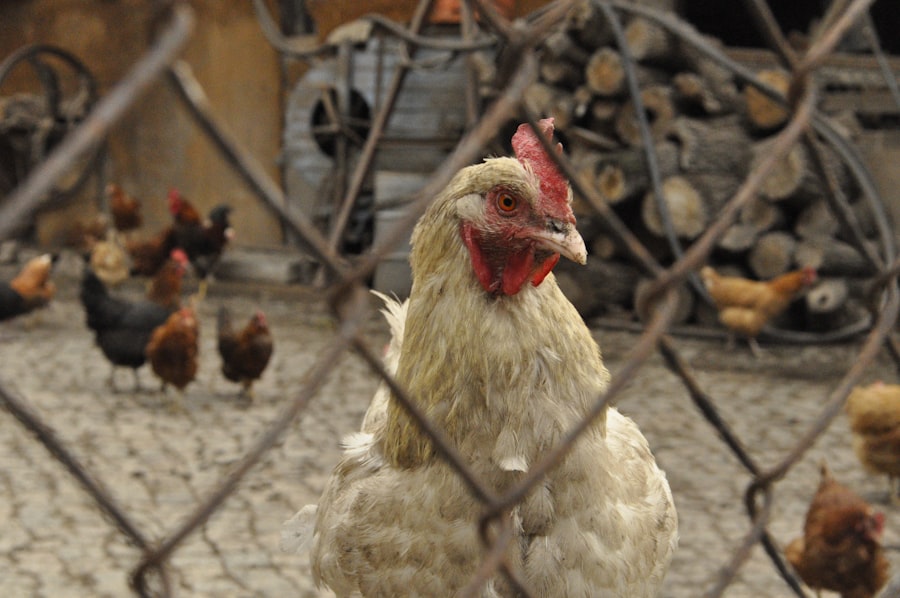Guinea fowl, also known as pintades, are a type of poultry that are native to Africa. They are known for their distinctive appearance, with speckled feathers and a helmet-like crest on their heads. Guinea fowl are popular for their ability to control pests such as ticks, flies, and other insects, making them a valuable addition to residential areas. They are also valued for their flavorful meat and eggs, making them a versatile and practical choice for small-scale poultry farming. Guinea fowl are hardy birds that are relatively low-maintenance, making them an attractive option for those looking to raise poultry in residential areas.
Guinea fowl are social birds that thrive in small flocks, and they are known for their alert and curious nature. They are also excellent foragers, and they will spend much of their time pecking and scratching for food. Guinea fowl are also known for their loud calls, which can be both a benefit and a drawback when it comes to keeping them in residential areas. Overall, guinea fowl are an interesting and unique addition to any residential poultry setup, and they offer a range of benefits for those looking to raise poultry in a suburban or urban environment.
Key Takeaways
- Guinea fowl are domesticated birds known for their pest control abilities and unique appearance
- Keeping guinea fowl in residential areas can help control pests like ticks and insects
- Considerations for keeping guinea fowl in residential areas include noise, zoning regulations, and predator protection
- Guinea fowl are known for their loud calls and can be aggressive towards other animals
- Housing and space requirements for guinea fowl include a secure coop and at least 3 square feet per bird
- Potential issues for keeping guinea fowl in residential areas include noise complaints and finding suitable housing
- Keeping guinea fowl in residential areas is feasible with proper planning and consideration for local regulations and neighbors
Benefits of Keeping Guinea Fowl in Residential Areas
There are several benefits to keeping guinea fowl in residential areas. One of the main advantages is their ability to control pests such as ticks, flies, and other insects. Guinea fowl are voracious insect-eaters, and they can help to keep pest populations in check without the need for chemical pesticides. This can be especially beneficial in residential areas where pest control is a concern, as guinea fowl can help to reduce the need for harmful chemicals that can be detrimental to the environment and human health.
In addition to pest control, guinea fowl also provide a source of fresh meat and eggs for those who keep them. Guinea fowl meat is lean and flavorful, and their eggs are rich and nutritious. This can be a valuable resource for those looking to raise their own food in a sustainable and ethical manner. Guinea fowl are also relatively low-maintenance compared to other types of poultry, making them an attractive option for those with limited time and space. Overall, the benefits of keeping guinea fowl in residential areas are numerous, making them a practical and valuable addition to any small-scale poultry operation.
Considerations for Keeping Guinea Fowl in Residential Areas
While there are many benefits to keeping guinea fowl in residential areas, there are also several considerations that should be taken into account before bringing these birds into a suburban or urban environment. One important consideration is the noise level of guinea fowl. These birds are known for their loud calls, which can be disruptive to neighbors, especially in close quarters. It’s important to consider whether the noise level of guinea fowl is compatible with the surrounding area before deciding to keep them.
Another consideration is the space requirements of guinea fowl. These birds are active foragers and require plenty of space to roam and explore. In residential areas, space can be limited, so it’s important to ensure that there is enough room for guinea fowl to move around comfortably without feeling cramped or confined. Additionally, guinea fowl can be flighty and may be prone to wandering, so it’s important to have secure fencing in place to prevent them from straying into neighboring properties or onto busy roads.
Noise and Behavior of Guinea Fowl
Guinea fowl are known for their loud calls, which can be both a benefit and a drawback when it comes to keeping them in residential areas. Their calls serve as a natural alarm system, alerting their owners to potential threats such as predators or intruders. This can be especially valuable in residential areas where security is a concern. However, the noise level of guinea fowl can also be disruptive to neighbors, especially in close quarters. It’s important to consider whether the noise level of guinea fowl is compatible with the surrounding area before deciding to keep them.
In addition to their calls, guinea fowl are also known for their alert and curious nature. They are social birds that thrive in small flocks, and they will spend much of their time pecking and scratching for food. Guinea fowl are also excellent foragers, and they will eagerly consume pests such as ticks, flies, and other insects. However, their active nature means that they require plenty of space to roam and explore. In residential areas, space can be limited, so it’s important to ensure that there is enough room for guinea fowl to move around comfortably without feeling cramped or confined.
Housing and Space Requirements for Guinea Fowl
Guinea fowl have specific housing and space requirements that should be taken into consideration when keeping them in residential areas. These birds are active foragers and require plenty of space to roam and explore. In residential areas, space can be limited, so it’s important to ensure that there is enough room for guinea fowl to move around comfortably without feeling cramped or confined. A general rule of thumb is to provide at least 3-4 square feet of space per bird in the coop, and at least 250-400 square feet of outdoor space per bird for free-ranging.
In addition to space requirements, guinea fowl also require secure housing to protect them from predators and the elements. The coop should be well-ventilated and provide protection from extreme temperatures, drafts, and moisture. It should also have secure fencing to prevent guinea fowl from straying into neighboring properties or onto busy roads. Providing roosting bars and nesting boxes will also ensure that guinea fowl have a comfortable and safe place to rest and lay eggs. Overall, providing adequate housing and space for guinea fowl is essential for their health and well-being in residential areas.
Potential Issues and Solutions for Keeping Guinea Fowl in Residential Areas

There are several potential issues that may arise when keeping guinea fowl in residential areas, but there are also solutions that can help mitigate these challenges. One common issue is the noise level of guinea fowl, which can be disruptive to neighbors. To address this issue, it’s important to communicate with neighbors about the presence of guinea fowl and work together to find solutions that are mutually beneficial. This may include providing soundproofing for the coop or limiting the number of birds to reduce noise levels.
Another potential issue is the tendency of guinea fowl to wander and stray into neighboring properties or onto busy roads. To prevent this, it’s important to have secure fencing in place around the coop and outdoor space. Additionally, providing enrichment such as toys and perches can help keep guinea fowl occupied and less likely to wander. It’s also important to regularly check the fencing for any signs of wear or damage that could compromise its effectiveness. By addressing these potential issues with proactive solutions, it is possible to successfully keep guinea fowl in residential areas.
Is Keeping Guinea Fowl in Residential Areas Feasible?
In conclusion, keeping guinea fowl in residential areas is feasible with careful consideration and planning. While there are several benefits to keeping guinea fowl in residential areas, such as pest control and a source of fresh meat and eggs, there are also considerations that should be taken into account, such as noise levels and space requirements. By addressing these considerations with proactive solutions, such as communicating with neighbors about noise levels and providing secure fencing to prevent wandering, it is possible to successfully keep guinea fowl in residential areas.
Overall, guinea fowl are an interesting and unique addition to any residential poultry setup, offering a range of benefits for those looking to raise poultry in a suburban or urban environment. With proper housing, space, and proactive solutions in place, keeping guinea fowl in residential areas can be a practical and valuable addition to any small-scale poultry operation.
Sure, here’s the paragraph with the related article included as an tag:
If you’re considering keeping guinea fowl in a residential area, it’s important to understand the specific requirements and considerations involved. In addition to understanding the needs of guinea fowl, it’s also crucial to have the right housing setup. For more information on suitable housing options for poultry, you can check out this informative article on the Producers Pride Sentinel Chicken Coop from PoultryWizard.com. This resource provides valuable insights into choosing the right coop for your birds and ensuring their comfort and safety in a residential setting.
FAQs
Can you keep guinea fowl in a residential area?
Yes, it is possible to keep guinea fowl in a residential area, but there are some considerations to keep in mind.
Are there any restrictions or regulations for keeping guinea fowl in a residential area?
It is important to check with local authorities and homeowners’ associations for any restrictions or regulations regarding keeping guinea fowl in a residential area. Some areas may have noise ordinances or zoning regulations that could affect keeping guinea fowl.
What are the benefits of keeping guinea fowl in a residential area?
Guinea fowl can help control insect populations, including ticks and other pests, making them beneficial for pest control in a residential area.
What are the challenges of keeping guinea fowl in a residential area?
Guinea fowl are known for their loud calls, which can be disruptive in a residential area. Additionally, they are known to roam and may cause damage to gardens or landscaping.
How can I keep guinea fowl in a residential area?
To keep guinea fowl in a residential area, it is important to provide them with a secure enclosure to prevent them from wandering and to minimize noise disturbances. Additionally, providing proper care and attention to the guinea fowl’s needs is essential for keeping them in a residential area.
Meet Walter, the feathered-friend fanatic of Florida! Nestled in the sunshine state, Walter struts through life with his feathered companions, clucking his way to happiness. With a coop that’s fancier than a five-star hotel, he’s the Don Juan of the chicken world. When he’s not teaching his hens to do the cha-cha, you’ll find him in a heated debate with his prized rooster, Sir Clucks-a-Lot. Walter’s poultry passion is no yolk; he’s the sunny-side-up guy you never knew you needed in your flock of friends!







